Ziniu Hu
Celine
TDRM: Smooth Reward Models with Temporal Difference for LLM RL and Inference
Sep 18, 2025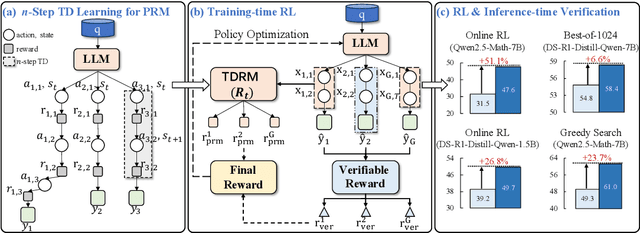

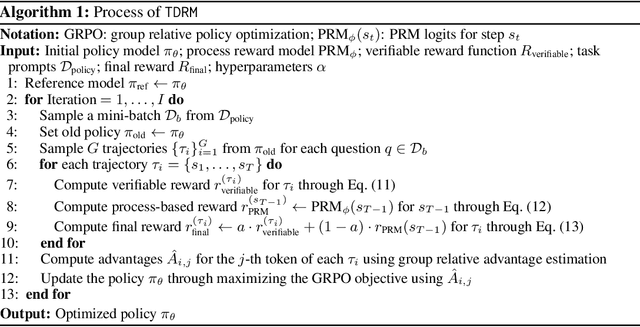

Abstract:Reward models are central to both reinforcement learning (RL) with language models and inference-time verification. However, existing reward models often lack temporal consistency, leading to ineffective policy updates and unstable RL training. We introduce TDRM, a method for learning smoother and more reliable reward models by minimizing temporal differences during training. This temporal-difference (TD) regularization produces smooth rewards and improves alignment with long-term objectives. Incorporating TDRM into the actor-critic style online RL loop yields consistent empirical gains. It is worth noting that TDRM is a supplement to verifiable reward methods, and both can be used in series. Experiments show that TD-trained process reward models (PRMs) improve performance across Best-of-N (up to 6.6%) and tree-search (up to 23.7%) settings. When combined with Reinforcement Learning with Verifiable Rewards (RLVR), TD-trained PRMs lead to more data-efficient RL -- achieving comparable performance with just 2.5k data to what baseline methods require 50.1k data to attain -- and yield higher-quality language model policies on 8 model variants (5 series), e.g., Qwen2.5-(0.5B, 1,5B), GLM4-9B-0414, GLM-Z1-9B-0414, Qwen2.5-Math-(1.5B, 7B), and DeepSeek-R1-Distill-Qwen-(1.5B, 7B). We release all code at https://github.com/THUDM/TDRM.
TreeRL: LLM Reinforcement Learning with On-Policy Tree Search
Jun 13, 2025Abstract:Reinforcement learning (RL) with tree search has demonstrated superior performance in traditional reasoning tasks. Compared to conventional independent chain sampling strategies with outcome supervision, tree search enables better exploration of the reasoning space and provides dense, on-policy process rewards during RL training but remains under-explored in On-Policy LLM RL. We propose TreeRL, a reinforcement learning framework that directly incorporates on-policy tree search for RL training. Our approach includes intermediate supervision and eliminates the need for a separate reward model training. Existing approaches typically train a separate process reward model, which can suffer from distribution mismatch and reward hacking. We also introduce a cost-effective tree search approach that achieves higher search efficiency under the same generation token budget by strategically branching from high-uncertainty intermediate steps rather than using random branching. Experiments on challenging math and code reasoning benchmarks demonstrate that TreeRL achieves superior performance compared to traditional ChainRL, highlighting the potential of tree search for LLM. TreeRL is open-sourced at https://github.com/THUDM/TreeRL.
Self-Evolving Visual Concept Library using Vision-Language Critics
Mar 31, 2025Abstract:We study the problem of building a visual concept library for visual recognition. Building effective visual concept libraries is challenging, as manual definition is labor-intensive, while relying solely on LLMs for concept generation can result in concepts that lack discriminative power or fail to account for the complex interactions between them. Our approach, ESCHER, takes a library learning perspective to iteratively discover and improve visual concepts. ESCHER uses a vision-language model (VLM) as a critic to iteratively refine the concept library, including accounting for interactions between concepts and how they affect downstream classifiers. By leveraging the in-context learning abilities of LLMs and the history of performance using various concepts, ESCHER dynamically improves its concept generation strategy based on the VLM critic's feedback. Finally, ESCHER does not require any human annotations, and is thus an automated plug-and-play framework. We empirically demonstrate the ability of ESCHER to learn a concept library for zero-shot, few-shot, and fine-tuning visual classification tasks. This work represents, to our knowledge, the first application of concept library learning to real-world visual tasks.
DataSciBench: An LLM Agent Benchmark for Data Science
Feb 19, 2025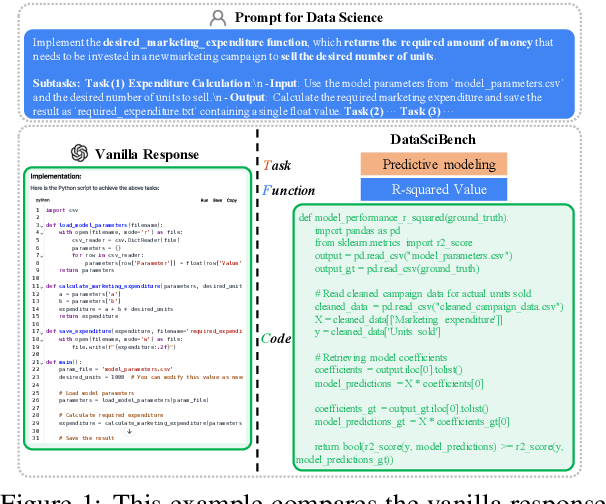

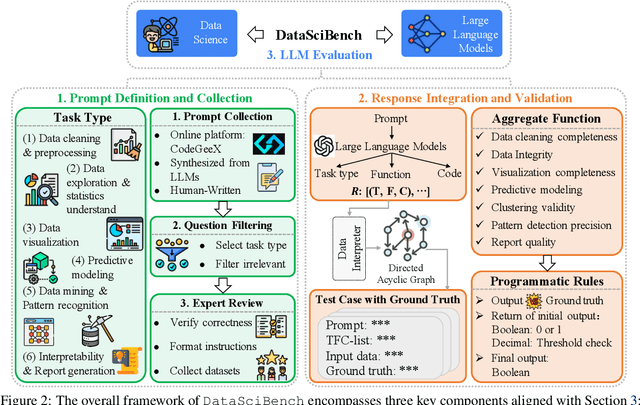
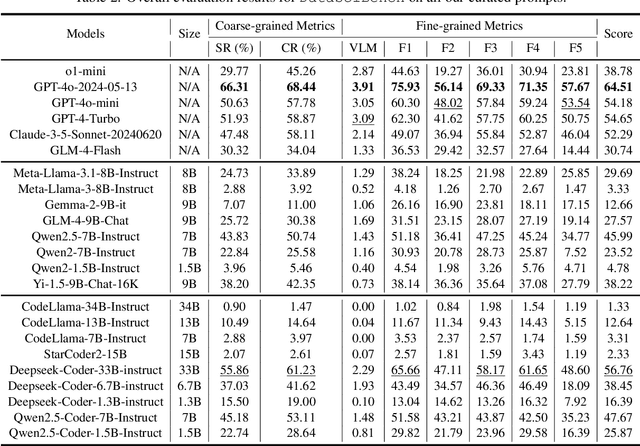
Abstract:This paper presents DataSciBench, a comprehensive benchmark for evaluating Large Language Model (LLM) capabilities in data science. Recent related benchmarks have primarily focused on single tasks, easily obtainable ground truth, and straightforward evaluation metrics, which limits the scope of tasks that can be evaluated. In contrast, DataSciBench is constructed based on a more comprehensive and curated collection of natural and challenging prompts for uncertain ground truth and evaluation metrics. We develop a semi-automated pipeline for generating ground truth (GT) and validating evaluation metrics. This pipeline utilizes and implements an LLM-based self-consistency and human verification strategy to produce accurate GT by leveraging collected prompts, predefined task types, and aggregate functions (metrics). Furthermore, we propose an innovative Task - Function - Code (TFC) framework to assess each code execution outcome based on precisely defined metrics and programmatic rules. Our experimental framework involves testing 6 API-based models, 8 open-source general models, and 9 open-source code generation models using the diverse set of prompts we have gathered. This approach aims to provide a more comprehensive and rigorous evaluation of LLMs in data science, revealing their strengths and weaknesses. Experimental results demonstrate that API-based models outperform open-sourced models on all metrics and Deepseek-Coder-33B-Instruct achieves the highest score among open-sourced models. We release all code and data at https://github.com/THUDM/DataSciBench.
QLASS: Boosting Language Agent Inference via Q-Guided Stepwise Search
Feb 04, 2025



Abstract:Language agents have become a promising solution to complex interactive tasks. One of the key ingredients to the success of language agents is the reward model on the trajectory of the agentic workflow, which provides valuable guidance during training or inference. However, due to the lack of annotations of intermediate interactions, most existing works use an outcome reward model to optimize policies across entire trajectories. This may lead to sub-optimal policies and hinder the overall performance. To address this, we propose QLASS (Q-guided Language Agent Stepwise Search), to automatically generate annotations by estimating Q-values in a stepwise manner for open language agents. By introducing a reasoning tree and performing process reward modeling, QLASS provides effective intermediate guidance for each step. With the stepwise guidance, we propose a Q-guided generation strategy to enable language agents to better adapt to long-term value, resulting in significant performance improvement during model inference on complex interactive agent tasks. Notably, even with almost half the annotated data, QLASS retains strong performance, demonstrating its efficiency in handling limited supervision. We also empirically demonstrate that QLASS can lead to more effective decision making through qualitative analysis. We will release our code and data.
Path-RAG: Knowledge-Guided Key Region Retrieval for Open-ended Pathology Visual Question Answering
Nov 26, 2024



Abstract:Accurate diagnosis and prognosis assisted by pathology images are essential for cancer treatment selection and planning. Despite the recent trend of adopting deep-learning approaches for analyzing complex pathology images, they fall short as they often overlook the domain-expert understanding of tissue structure and cell composition. In this work, we focus on a challenging Open-ended Pathology VQA (PathVQA-Open) task and propose a novel framework named Path-RAG, which leverages HistoCartography to retrieve relevant domain knowledge from pathology images and significantly improves performance on PathVQA-Open. Admitting the complexity of pathology image analysis, Path-RAG adopts a human-centered AI approach by retrieving domain knowledge using HistoCartography to select the relevant patches from pathology images. Our experiments suggest that domain guidance can significantly boost the accuracy of LLaVA-Med from 38% to 47%, with a notable gain of 28% for H&E-stained pathology images in the PathVQA-Open dataset. For longer-form question and answer pairs, our model consistently achieves significant improvements of 32.5% in ARCH-Open PubMed and 30.6% in ARCH-Open Books on H\&E images. Our code and dataset is available here (https://github.com/embedded-robotics/path-rag).
PIANIST: Learning Partially Observable World Models with LLMs for Multi-Agent Decision Making
Nov 24, 2024



Abstract:Effective extraction of the world knowledge in LLMs for complex decision-making tasks remains a challenge. We propose a framework PIANIST for decomposing the world model into seven intuitive components conducive to zero-shot LLM generation. Given only the natural language description of the game and how input observations are formatted, our method can generate a working world model for fast and efficient MCTS simulation. We show that our method works well on two different games that challenge the planning and decision making skills of the agent for both language and non-language based action taking, without any training on domain-specific training data or explicitly defined world model.
Physics-Informed Regularization for Domain-Agnostic Dynamical System Modeling
Oct 08, 2024



Abstract:Learning complex physical dynamics purely from data is challenging due to the intrinsic properties of systems to be satisfied. Incorporating physics-informed priors, such as in Hamiltonian Neural Networks (HNNs), achieves high-precision modeling for energy-conservative systems. However, real-world systems often deviate from strict energy conservation and follow different physical priors. To address this, we present a framework that achieves high-precision modeling for a wide range of dynamical systems from the numerical aspect, by enforcing Time-Reversal Symmetry (TRS) via a novel regularization term. It helps preserve energies for conservative systems while serving as a strong inductive bias for non-conservative, reversible systems. While TRS is a domain-specific physical prior, we present the first theoretical proof that TRS loss can universally improve modeling accuracy by minimizing higher-order Taylor terms in ODE integration, which is numerically beneficial to various systems regardless of their properties, even for irreversible systems. By integrating the TRS loss within neural ordinary differential equation models, the proposed model TREAT demonstrates superior performance on diverse physical systems. It achieves a significant 11.5% MSE improvement in a challenging chaotic triple-pendulum scenario, underscoring TREAT's broad applicability and effectiveness.
Strategist: Learning Strategic Skills by LLMs via Bi-Level Tree Search
Aug 20, 2024



Abstract:In this paper, we propose a new method Strategist that utilizes LLMs to acquire new skills for playing multi-agent games through a self-improvement process. Our method gathers quality feedback through self-play simulations with Monte Carlo tree search and LLM-based reflection, which can then be used to learn high-level strategic skills such as how to evaluate states that guide the low-level execution.We showcase how our method can be used in both action planning and dialogue generation in the context of games, achieving good performance on both tasks. Specifically, we demonstrate that our method can help train agents with better performance than both traditional reinforcement learning-based approaches and other LLM-based skill learning approaches in games including the Game of Pure Strategy (GOPS) and The Resistance: Avalon.
Dataset Distillation for Offline Reinforcement Learning
Aug 01, 2024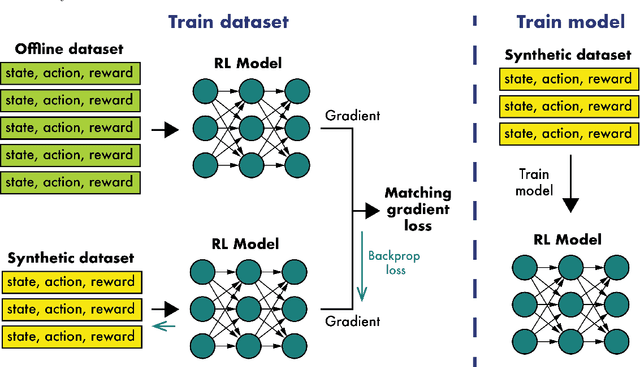

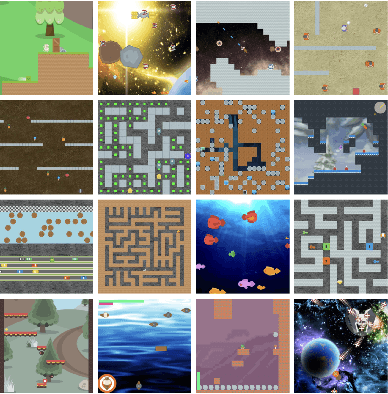

Abstract:Offline reinforcement learning often requires a quality dataset that we can train a policy on. However, in many situations, it is not possible to get such a dataset, nor is it easy to train a policy to perform well in the actual environment given the offline data. We propose using data distillation to train and distill a better dataset which can then be used for training a better policy model. We show that our method is able to synthesize a dataset where a model trained on it achieves similar performance to a model trained on the full dataset or a model trained using percentile behavioral cloning. Our project site is available at $\href{https://datasetdistillation4rl.github.io}{\text{here}}$. We also provide our implementation at $\href{https://github.com/ggflow123/DDRL}{\text{this GitHub repository}}$.
 Add to Chrome
Add to Chrome Add to Firefox
Add to Firefox Add to Edge
Add to Edge